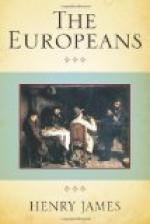Toward the middle of August he was obliged to leave home for some days; an old friend, with whom he had been associated in China, had begged him to come to Newport, where he lay extremely ill. His friend got better, and at the end of a week Acton was released. I use the word “released” advisedly; for in spite of his attachment to his Chinese comrade he had been but a half-hearted visitor. He felt as if he had been called away from the theatre during the progress of a remarkably interesting drama. The curtain was up all this time, and he was losing the fourth act; that fourth act which would have been so essential to a just appreciation of the fifth. In other words, he was thinking about the Baroness, who, seen at this distance, seemed a truly brilliant figure. He saw at Newport a great many pretty women, who certainly were figures as brilliant as beautiful light dresses could make them; but though they talked a great deal—and the Baroness’s strong point was perhaps also her conversation—Madame Munster appeared to lose nothing by the comparison. He wished she had come to Newport too. Would it not be possible to make up, as they said, a party for visiting the famous watering-place and invite Eugenia to join it? It was true that the complete satisfaction would be to spend a fortnight at Newport with Eugenia alone. It would be a great pleasure to see her, in society, carry everything before her, as he was sure she would do. When Acton caught himself thinking these thoughts he began to walk up and down, with his hands in his pockets, frowning a little and looking at the floor. What did it prove—for it certainly proved something—this lively disposition to be “off” somewhere with Madame Munster, away from all the rest of them? Such a vision, certainly, seemed a refined implication of matrimony, after the Baroness should have formally got rid of her informal husband. At any rate, Acton, with his characteristic discretion, forbore to give expression to whatever else it might imply, and the narrator of these incidents is not obliged to be more definite.
He returned home rapidly, and, arriving in the afternoon, lost as little time as possible in joining the familiar circle at Mr. Wentworth’s. On reaching the house, however, he found the piazzas empty. The doors and windows were open, and their emptiness was made clear by the shafts of lamp-light from the parlors. Entering the house, he found Mr. Wentworth sitting alone in one of these apartments, engaged in the perusal of the “North American Review.” After they had exchanged greetings and his cousin had made discreet inquiry about his journey, Acton asked what had become of Mr. Wentworth’s companions.
“They are scattered about, amusing themselves as usual,” said the old man. “I saw Charlotte, a short time since, seated, with Mr. Brand, upon the piazza. They were conversing with their customary animation. I suppose they have joined her sister, who, for the hundredth time, was doing the honors of the garden to her foreign cousin.”




